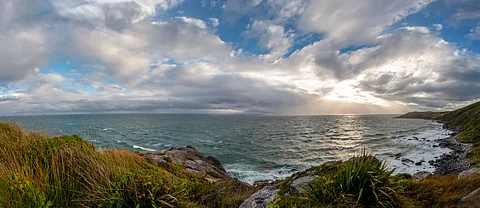

View of Foveaux Strait, Southland, New Zealand, where last year an independent panel of experts rejected an application by Ngāi Tahu Seafood Ltd. to set up an offshore salmon farm.
Photo: Adobe Stock.
New Zealand's Oceans and Fisheries Minister, Shane Jones, announced five new Aquaculture Settlement Areas (ASAs) that, he said, will help ensure Ngāi Tahu - the principal Māori iwi (tribe) of the South Island - shares in the opportunities aquaculture offers for Southland's economy.
"The Aquaculture Settlement Areas I'm announcing today set aside space so the Crown and Ngāi Tahu can assess their potential for aquaculture development. They make up a collective 8787ha and include areas suitable for salmon, mussel, and seaweed farming," Minister Jones explained.
The ASAs were established in 2004 as part of legislation that allocates 20 percent of newly created and planned aquaculture areas to the iwi. The five ASAs now announced are offshore from Port Pegasus, Rarotoka South, Rarotoka North, Ruapuke, and Port Adventure.
Since the New Zealand conservative Coalition Government came to power, we have heard about several initiatives related to aquaculture. These include breeding snapper suitable for commercial fish farming - known as the super snapper project -, or support for a mussel farming project to increase survival rates of New Zealand mussels and grow the industry.
"The Coalition Government has recognised aquaculture's enormous potential and made its development a priority. We've set an ambitious goal for aquaculture in New Zealand, aiming for it to be a AUD 3 billion (EUR 1.86 billion / USD 1.95 billion) industry by 2035," New Zealand's Oceans and Fisheries Minister stated.
Moreover, Shane Jones pointed out that there is international demand for New Zealand aquaculture products and that his department is committed to maximizing its growth.
"That means cutting away red tape and roadblocks so the industry can better contribute to our export-led recovery and the rebuilding of New Zealand's economy. Making space for this kind of exploration with Ngāi Tahu today will bring the certainty needed for jobs, opportunities and export dollars tomorrow," Jones continued.
The Oceans and Fisheries Minister also said that while this exploration is underway, all current fishing activities within the ASAs, whether recreational, commercial or traditional, will be allowed to continue.
"Any space Ngāi Tahu wants to take forward and develop into aquaculture ventures will still be subject to the resource consent process," Shane Jones explained.
Last year, for example, an independent panel of experts rejected the application submitted by Ngāi Tahu Seafood Ltd. to set up an offshore salmon farm at Te Ara a Kiwa (Foveaux Strait), adjacent to the Rakiura National Park. At the time, despite recognizing its obvious cultural, economic, and social benefits, the panel found they did not sufficiently outweigh the environmental costs.
